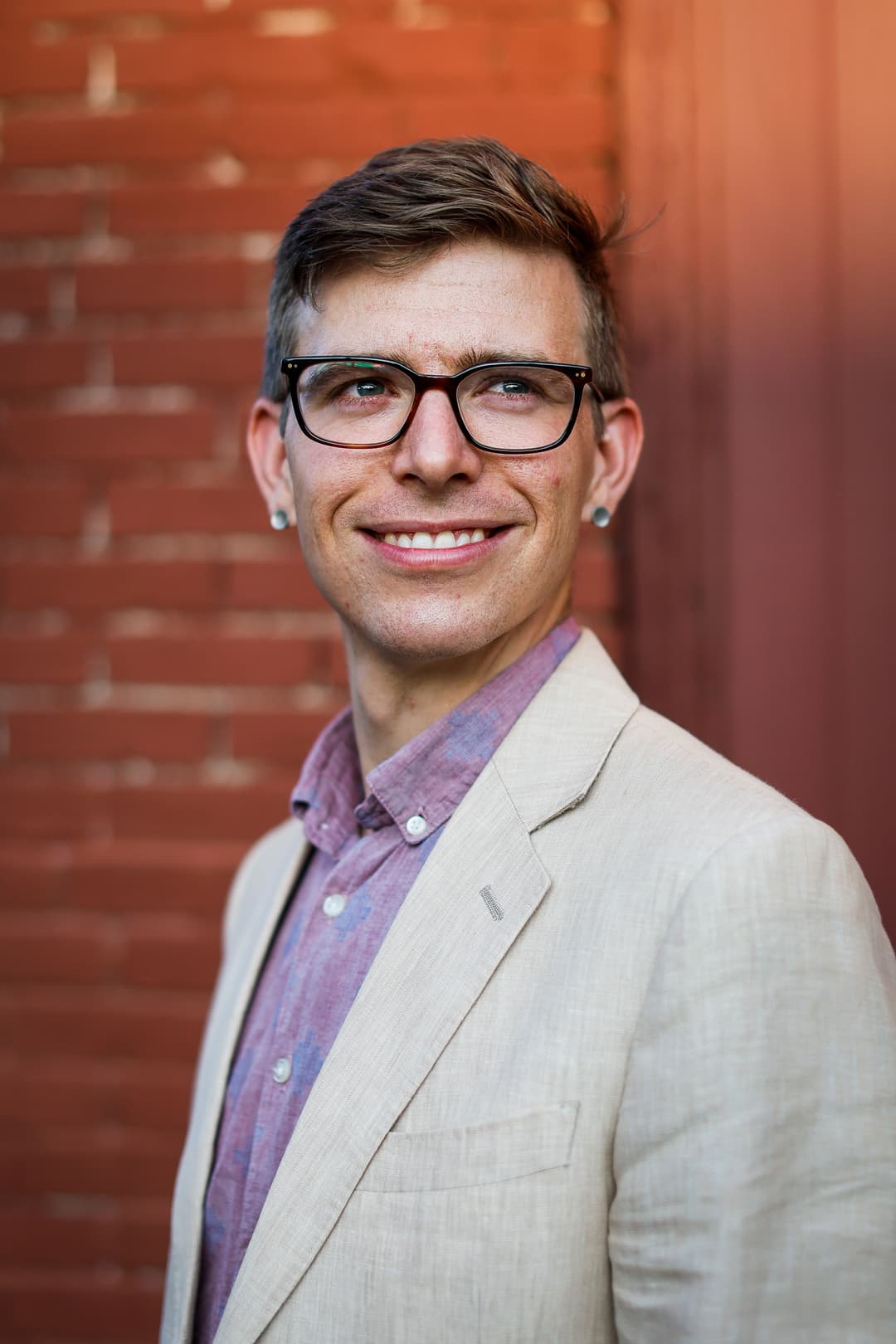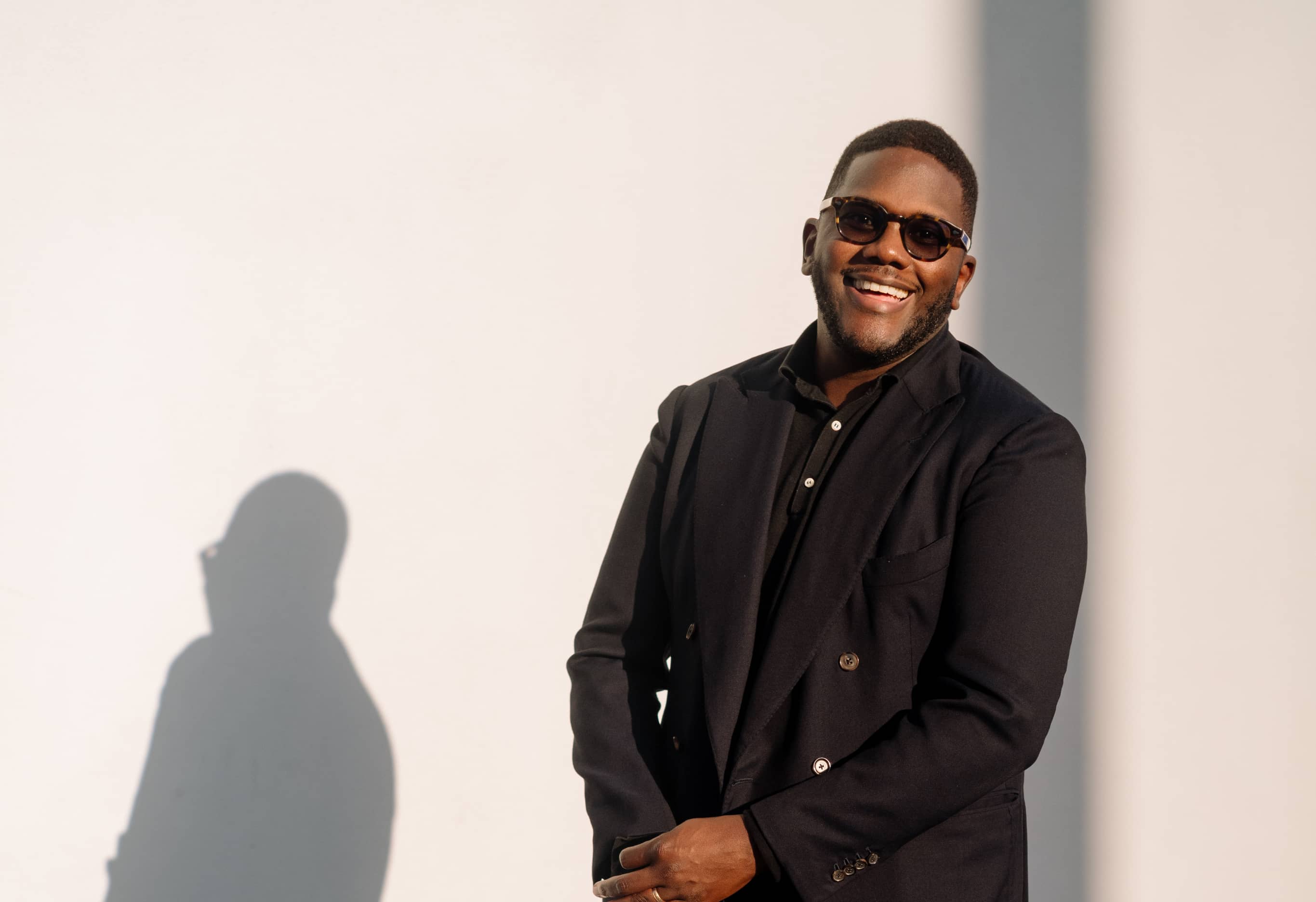
Louis Joachim
Narrative Property Partners
Louis Joachim built a successful career managing top artists in the music industry and brokering deals in the world of commercial real estate. Now, in the next stage in his life, he is leveraging municipal partnerships and his expertise to build mixed-income housing and promote social mobility in Florida.
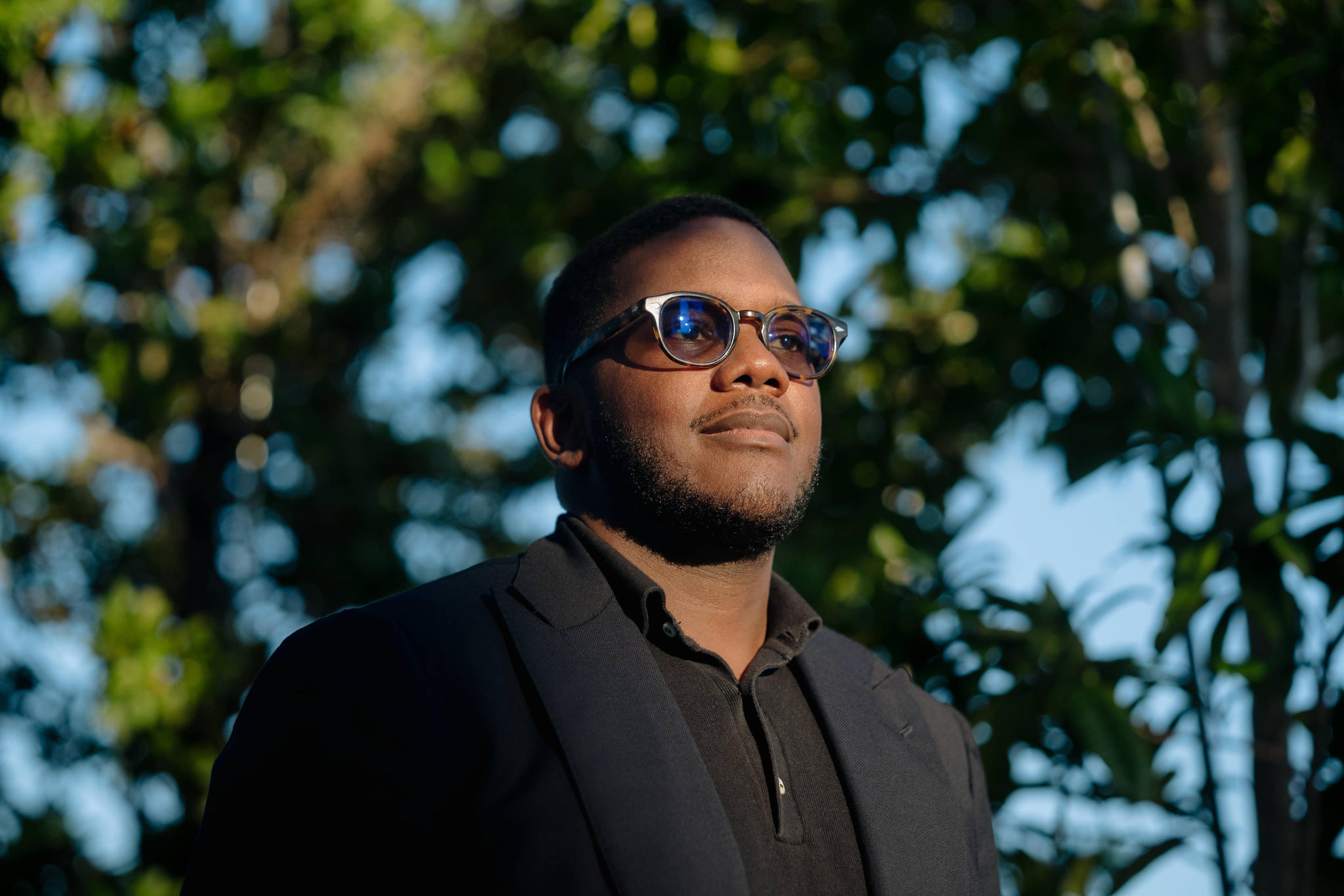
LOUIS JOACHIM BY GESI SCHILLING FOR COMMONPLACE.

AWARDS PRESENTED TO LOUIS JOACHIM AS THE MANAGER OF RAPPER DANZEL CURRY.
What is the path that led you to where you are today?
My family is from Haiti, but I was born in Manhattan, where my dad was in the real estate business. He went from being a bookkeeper to doing big co-op conversions in the 80s. I very much grew up in the business, which I think is pretty unique to people from my background. You could say I got in the old fashioned way: I was born into it.
However, when I was younger, I wanted to do something different. I didn't want to be in the family business of building, brokerage, and management. My first big dream was to be in the music business. I co-founded an artist management and Miami retailer called Lower East Coast with some people I knew from my college days at the University of Miami. It took time and effort, but my partners and I built that business from the ground up and now I'm the artist manager for a pretty successful artist, Denzel Curry.
While I was working on that, I also had a day job working for Rose Associates, a major landlord in Manhattan. I was handling leasing and asset management for their commercial portfolio. I loved the brokerage business and I think I was pretty good at it, too, even though I found success in music first.
About three years ago though, I had an epiphany. I realized that I had satisfied my 16 year-old self, building both sides of my life into something that I wanted, and that I could be proud of. Now I'm looking to satisfy my 60 year-old self, and to me that means being more selfless.
What are you working on now as you move into the next stage of your life and career?
I founded Narrative Property Partners — a development company focused on mixed-income housing near downtown amenities in Central and South Florida. We're looking to acquire naturally occurring affordable housing of around 50 units up to around $30 million. We are also pursuing several development projects involving ground leases with local municipalities, with budgets ranging from half a million to $20 million. We have several community bank relationships that will provide financing, and are seeking to utilize grants and subsidies from municipalities, housing authorities, and their Community Redevelopment Agencies (CRAs).
Right now, my main focus is on trying to identify more joint venture opportunities with local municipalities. Literally every two miles you drive in Florida there is a new municipality with its own township, mayor, and budget. And by building those relationships, I could possibly avoid signing a check for land upfront. With prices in Florida today, buying land myself is not going to work for me on the equity side. With a commitment from a city in hand, I could raise my 35% of the capital stack, go to a bank, and get construction loans to build buildings with about a 10 to 15-year regulatory compliance period. The goal is to build affordably and serve the middle-market with city land. In the future, these could potentially be refinanced to make improvements, but, ideally, the rent limits will stay in place.
To give you an example, I'm working on a proposal now to reposition parking lots in Opa-locka. The plan is to replace an 80 spot parking lot with a new development featuring public and private residence parking with up to 50 residential units on top. They would have separate entrances, and the whole thing would be programmed appropriately. I love the idea and I think the city loves the idea, so I'm optimistic.
What challenges do you face today? What stands in the way of getting things done?
There's been all this talk about San Francisco and New York City being the least affordable cities in the country. But I can say with confidence that we are definitely next. This will soon be the newest “least affordable place in the country.” Land is getting more expensive because people are betting on the potential future value of land in Miami. So you get to a situation where, even in neighborhoods like Little Haiti, land is too expensive to support anything but luxury condos and rental buildings. Meanwhile, the neighborhood has no supermarkets or other essentials. What it does have is an Hermès store less than a mile away and rents that are quickly becoming unaffordable to the people that live there.
In these areas, big developers, many of them coming in from New York, have purchased land and are just sitting on it and waiting for it to appreciate. For an emerging developer like me, a black developer without a huge balance sheet, this kind of environment is difficult because I just can't afford to buy land at that price, especially for the projects I want to build.
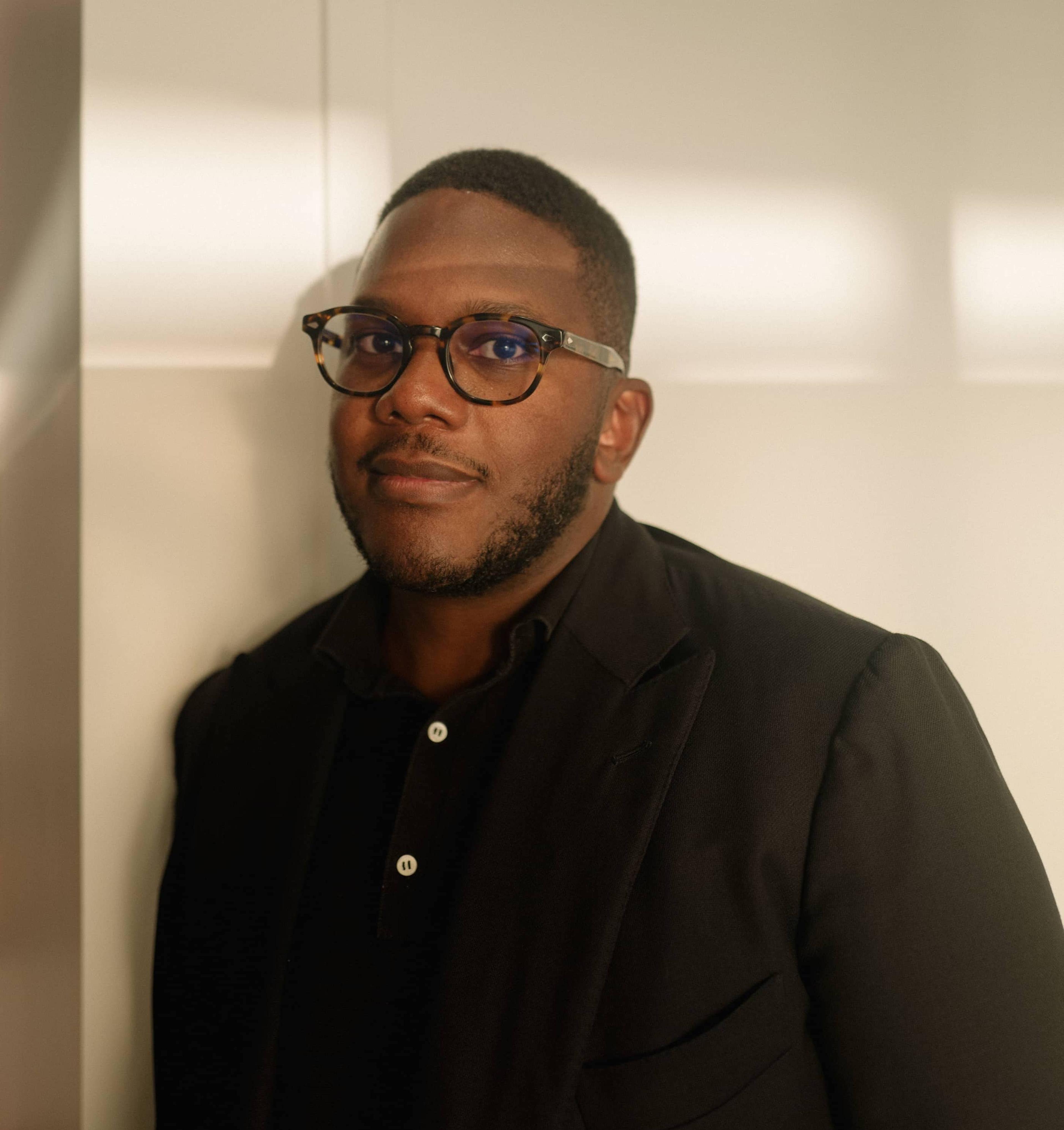
LOUIS JOACHIM BY GESI SCHILLING FOR COMMONPLACE.
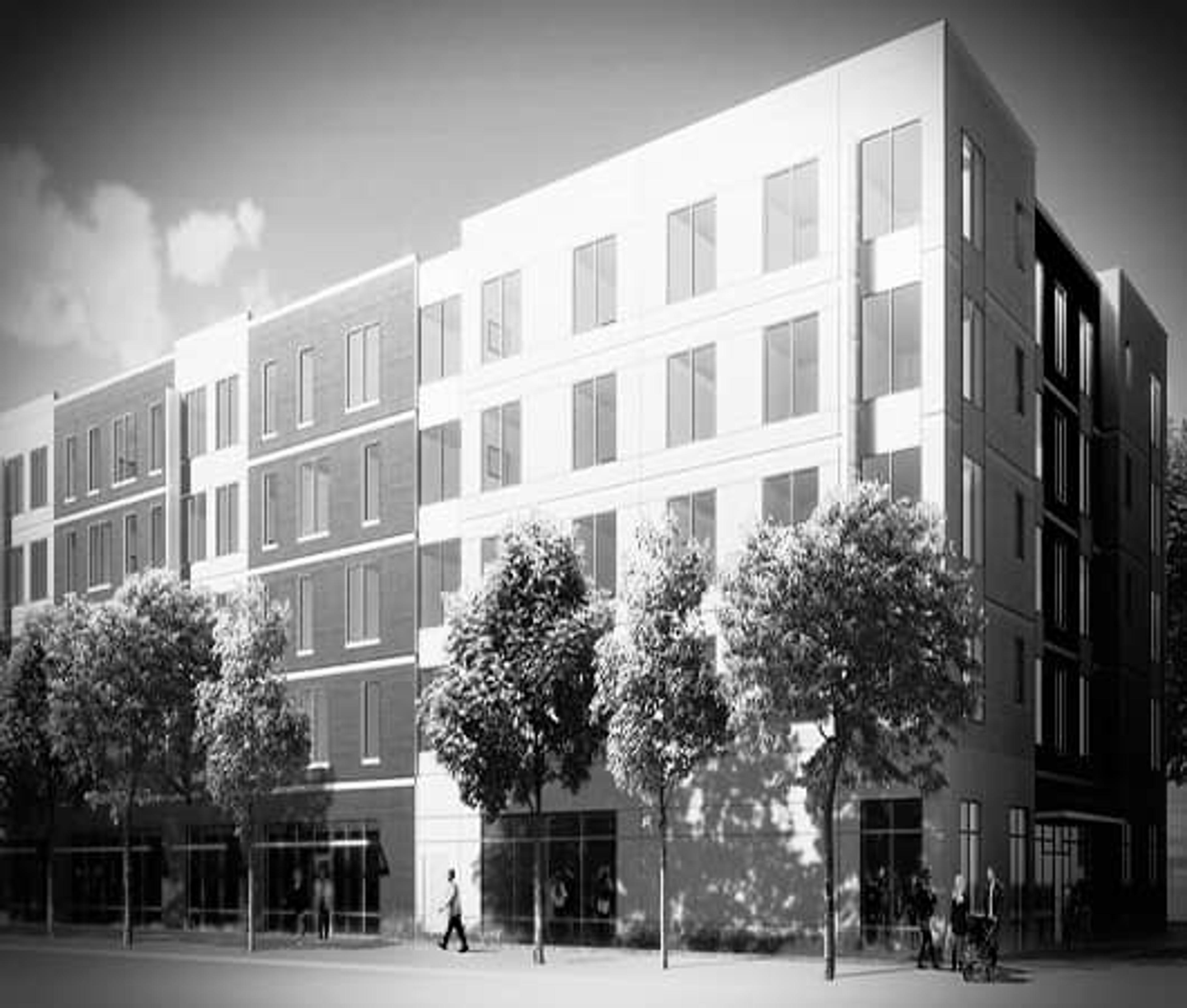
RENDER OF 50 UNIT MIXED-INCOME HOUSING PROPOSAL IN OPA LOCKA, FL. COURTESY OF NARRATIVE PARTNERS.
How are you financing your projects in this difficult environment?
To get my projects going, I've been working with banks like Chase or Wells Fargo for financing, which have community banks set up that are regionally-based and focused on investing dollars in underserved communities. They invest between a million and 30 million dollars with very strict underwriting in terms of which projects are approved and who they are serving. Those are my capital sources for debt.
Equity comes from friends and family, but there are also some grants from local CRAs, like the one for our Opa-locka housing proposal, that are definitely helpful. Florida also just passed a bill that will allow funding from the Florida Housing Finance Corporation for affordable housing. Unfortunately, it's also going to block rent control in the State of Florida, but the housing funding could make a major difference for people like me.
While we're on the topic of financing, there has been significant media coverage of the challenges black developers face around access to capital and to the industry as a whole. Have these issues manifested in your career, and how do you handle them?
I'm lucky in that I have people I can call, and that I can rely on, but I don't have all the money in the world. It's always a challenge having to prove myself to people that play a very traditional, exclusive game. But I do think it's getting better; it's definitely not as bad today as it was for my father. One thing that I think helps me, and helped my father, is that first and second-generation immigrants to the United States look at challenges differently. For many of us, things can't be worse than where we came from in terms of access to opportunity. So yes, you need to deal with racism, but you just have to grin and bear it in a lot of ways. It teaches you to adapt and grind through.
That said, of course I'm still nervous about proving myself in this business. I'm Black. I'm not necessarily known in Florida. My parents did not do business in Miami. This is kind of on me now to get it done. But for me, it's about creating environments for all kinds of people to live together and make connections that can shape their futures in a positive way — that's my mission. And when I focus on that, my anxiety fades away.

LOUIS JOACHIM BY GESI SCHILLING FOR COMMONPLACE.

LOUIS JOACHIM WITH HIS FATHER LOUIS JOACHIM SR. AND BROTHER ALI JOACHIM.
How have your ideas about social impact inspired your work?
What I really want to see is people understanding the benefit of having people of different income levels living together — and why that's worth investing in. And I'm not just talking about developers: so many of the places that don't want affordable housing tend to be upper-crust urban neighborhoods. People are afraid of their home values going down. And the consequence is that when I look at people living in Florida today, they definitely don't have the opportunities that I had, living in places like Little Haiti in Miami, where the neighborhood is 80% renters. They don't have the resources and connections that allowed me to follow my dreams, get an education, or to have this business to fall back on. It's so rare. Instead of segregating poor people onto islands where they can never interact with people from other walks of life, we should push for mixed-income neighborhoods that give lower-income people opportunities to meet and interact with people who have more resources.
Besides boosting social mobility, mixing incomes also bolsters the tax base, allowing people to have access to things like nicer parks and better services. When we invest in affordable housing or simple things like street beautification, we create a better urban tapestry for all, which will only increase the value of those neighborhoods. By fixing deep-rooted problems in the living environment, we can do a lot to change the course of entire cities and their inhabitants.
For example, growing up, my grandmother lived in faith-based elderly housing subsidized by a non-denominational church for the common good of the community. A lot of people can learn from these places. I have family members that still live there, in an old building from the 60s in downtown Orlando. Rents are in the low $800s, which is a great value. The performing arts center is just around the corner, so if you live there, you can partake in the arts and culture of the city, or what I like to think of as the common humanity of a city. It's the kind of place where people who may not have 401k's or who don't have major retirement savings and are on Medicare can live gracefully. These are the places that inspire me. These places give people who may not have a lot of money a sense of dignity.
My philosophy is simple: when parents have to be away from their kids, commuting back and forth by bus through traffic for hours just to get to their jobs in downtown Miami Beach — all for minimum wage — that's not creating a healthy living environment for anyone. Everybody deserves more dignity than that.
What drives you and defines your approach?
My father, a Haitian immigrant, was able to build a life in this country because of the amazing people he met in his neighborhood and community who supported him and lifted him up throughout his career. How many other people out there are like him, looking for that opportunity to build a career and raise a family? Thousands? Millions? That's why it's so crucial to build affordable and mixed-income housing in places like the City of Miami and City of Miami Beach, right in the center of town where amenities and jobs are most accessible. However, to do this, I need to build public-private partnerships with municipalities throughout Florida. Public land, or even just a density bonus from the local municipality or CRA, is crucial because we're looking to keep units affordable for people earning 60-100% of the local median income levels in places that might only support luxury development.
Fortunately, I've always been a specific type of person, someone who reads a trade magazine and thinks: who should I get to know? In college, I was president of a business fraternity, and I would invite all these business leaders to come speak in order to make connections. One of these speakers, Jason Shapiro of Aztec Group, just had lunch with me about two months ago. It's been 20 years, but he's still my mentor, and we still talk monthly. I built long-lasting relationships like that, and I have no problem reaching out to people cold, or even through something like Instagram. I'm always focused on building my network; raising funds for my friends' projects, reaching out to people and speaking with them, and really just helping people out any way I can.
I was telling my brother: “You know the sales advice: 'don't be thirsty'?” Well, I'm beyond parched, I will stop at nothing. You just have to be consistent, persistent, and kind.
“One thing my dad always said was that ‘your network is your net worth.’”

LOUIS JOACHIM BY GESI SCHILLING FOR COMMONPLACE.
Who inspires you, or has helped you get this far?
Knowledge, including business and real estate knowledge, is gained and passed down at the dinner table. Growing up, my dad would either come home from work and talk with me, or I would be out at work with him looking at buildings and working on projects. That's how I learned what it takes to build a building and get a sense of what it's like to work on a project.
One thing my dad always said was that “your network is your net worth.” I must be rich then because I've been blessed to have met so many people that are prominent in the business. Whether they are local bankers, debt equity brokers, or other developers, I've also gone to school with them, gone on vacation with them, had them over for dinner; my cousin was a prominent equity broker in the city who worked with my dad years and years ago, for example. These relationships opened doors for me and are what have driven my success - I wouldn't have gotten as far as I have if my dad had never taught me to value them.
What legacy do you hope to leave?
Last night, I was putting my son to bed and I asked him, “What do you want to be when you grow up?” And he replied, “A dad.” I loved his answer and I'm repeating it here. I do everything I can to be with my son and just spend time with him.
It's important - I could not be the person I am today without my dad and my mom. My dad put me in a position to think strategically through a career and through the things that I wanted to do. He never wanted me in the rap business — and, for the record, I don't blame him. I wouldn't want my son to be in the rap business either. But when I got into music, I was able to get into it with a mind to make it work the right way because of him. I want to be that person for my son, too.
As for my work, I'm in this for the long haul. I don't see myself stopping. I'll be making neighborhoods better until I drop.

Louis Joachim
Narrative Property Partners
